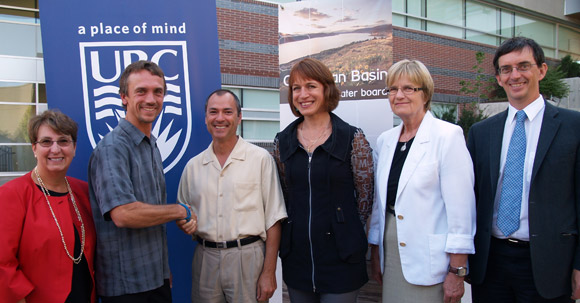
Prof. John Janmaat is congratulated on his appointment as Leading Edge Endowment Fund (LEEF) BC Regional Innovation Chair in Water Resources and Ecosystem Sustainability by BC Agriculture Minister Norm Letnick. Participants in a ceremony at UBC announcing the endowment are, from left: Cynthia Mathieson, Dean, Irving K. Barber School of Arts and Sciences; John Janmaat; Norm Letnick; Okanagan Water Basin Board Executive Director Anna Warwick Sears; UBC Vice Provost Research and Dean of Graduate Studies Miriam Grant; UBC Provost Wesley Pue.
Ecosystem sustainability is focus of $2.5-million endowment
UBC resource economics Prof. John Janmaat has been appointed the Leading Edge Endowment Fund (LEEF) BC Regional Innovation Chair in Water Resources and Ecosystem Sustainability.
The chair is supported by a $2.5-million endowment fund established through community partnership. The Leading Edge Endowment Fund contributed $1.25 million from its BC Regional Innovation Chair program. The Okanagan Basin Water Board (OBWB) contributed $500,000 on behalf of the three Okanagan regional districts and the Real Estate Foundation of B.C. provided $250,000. UBC also contributed to the endowment fund, while Columbia Basin Trust added $150,000 to support research initiatives by Janmaat.
“The research chair position is valuable to both the university and community — it provides a bridge between researchers at our campus and people beyond the campus, which is very important,” says Janmaat.
“As chair, my goal is to facilitate research that helps address the challenges of sharing water here in the Okanagan, and to promote UBC’s Okanagan campus, in partnership with others in our region, as a center of expertise to help address water resource challenges around the globe.”
Part of Janmaat’s role is finding and collaborating with the best people possible to address questions or advise on water and sustainability issues. He notes an advisory committee of stakeholders will help to identify important issues and move research from the university to the community.
“The LEEF BC Regional Innovation Chair is focused on the water use challenges that directly impact Okanagan communities,” says BC Minister of Agriculture and Kelowna-Lake Country MLA Norm Letnick, who announced the research chair appointment at UBC’s Okanagan campus, on behalf of Pat Bell, Minister of Jobs, Technology and Skills Training, which has responsibility for LEEF.
“The B.C. Government supported the 2010 development of an innovative computer model that determines water resource requirements for Okanagan agricultural land, and that model is now being adapted for use in other parts of the province,” says Letnick. “As British Columbia’s new agriculture minister I look forward to building on the strong partnerships established with all levels of government and stakeholders as we work together on the common goal of water sustainability in the region.
“Understanding more about water and ecosystem sustainability will help improve the management of water resources. This partnership illustrates the power of provincial and regional governments, and the region itself — public and private partners — all working together to pursue a common goal.”
Some key future projects include mechanisms for water allocation and watershed governance, trans-boundary water issues in the Columbia basin, and managing interactions between land use, water resources, and ecosystem management, with special attention to the role of agriculture.
Prof. Deborah Buszard, principal and deputy vice chancellor of UBC’s Okanagan campus, says overcoming the water challenges facing the Okanagan Valley requires a strong community effort that involves academic research, strategic thinking, stakeholder engagement, partnerships and creative approaches.
“John Janmaat’s experience and knowledge with water-management issues combined with his ability to bring people from multiple disciplines together will be essential in identifying strategic, holistic solutions that address the unique needs of our region,” says Buszard. “UBC is proud to support this partnership, which closely reflects our values in working towards a civil and sustainable society.”
Janmaat’s current research activities and partnerships span topics from understanding residential water use in Kelowna and issues of governance and sustainability in British Columbia, to understanding the current state of water quality in the Columbia basin and identifying the best small- scale water storage for rural Nepali villages.
“The Okanagan Basin Water Board is pleased to be a partner in this initiative, strengthening the ties between UBC and the communities of the Okanagan,” says Stu Wells, chair, Okanagan Basin Water Board. “There is a lot of change going on in the world, and it will be really important to have excellent research for decision making. We’d also like to thank the Province of BC and the Real Estate Foundation for making this investment in the future of the Okanagan.”
“Novel approaches to fresh water sustainability are a core area of focus for our Foundation” says Jack Wong, CEO of the Real Estate Foundation of BC. “We are very pleased to make this investment in UBC that will get people talking and working together to find innovative long- term solutions to water management in BC.”
The Government of British Columbia established LEEF to attract world-class researchers to B.C., promote economic growth and job creation, strengthen the province’s position as a centre of excellence in research, match government funding with money from the private sector and individual donors, and promote the unique roles that B.C. universities and colleges play in innovation in British Columbia.
— 30 —